“Do unto others as you would have them do unto you.”
---Jesus
 The residents of Roatan impressed us with their warm smiles and friendly attitudes. No one seemed pushy or obnoxious about selling their wares or begrudging about providing service to tourists. Undoubtedly, when the first tourists started arriving in Jamaica, Mazatlan and other traditional ports, they encountered similar attitudes, but over the years, the locals have been hardened to the reality that the bottom line is money.
The residents of Roatan impressed us with their warm smiles and friendly attitudes. No one seemed pushy or obnoxious about selling their wares or begrudging about providing service to tourists. Undoubtedly, when the first tourists started arriving in Jamaica, Mazatlan and other traditional ports, they encountered similar attitudes, but over the years, the locals have been hardened to the reality that the bottom line is money.
On our ride back from Tabyana Beach, a “volunteer guide” came on the bus to tell us about the history and culture of Roatan. As to whether or not she added anything to the ride is debatable, but she made only a small pitch for tips, and most of us responded with a dollar or two. The bus made a couple of stops on the way down for us to take photos, including one dramatic viewpoint where a vendor sold his wares off the side of the road. A boy about ten years old came along carrying a large iguana, and he smilingly obliged several pretty young girls by letting them hold the iguana and snap photos. It of course reminded me of other ports where locals would show up with a parrot, monkey or iguana, asking for some specific payment for a photo. When the bus was ready to leave, the girls, who monopolized the boy’s time, smiled and said thanks, and they probably felt the thrill of being with pretty twenty-something Americans was ample payment to the boy, but they didn’t turn to see the sad sigh as he realized no payment was forthcoming.
 When traveling, be cognizant of your impact on the area where you travel. Many people earn their livelihoods by serving the tourists. Don’t be “ugly Americans,” like those physically beautiful women who took advantage of a poor young local. It also applies to ecological impact, including littering or picking up small creatures that will soon die when removed their natural environment. Our actions will dictate how future tourists, including ourselves, will be treated on subsequent trips.
When traveling, be cognizant of your impact on the area where you travel. Many people earn their livelihoods by serving the tourists. Don’t be “ugly Americans,” like those physically beautiful women who took advantage of a poor young local. It also applies to ecological impact, including littering or picking up small creatures that will soon die when removed their natural environment. Our actions will dictate how future tourists, including ourselves, will be treated on subsequent trips.
---Jesus
 The residents of Roatan impressed us with their warm smiles and friendly attitudes. No one seemed pushy or obnoxious about selling their wares or begrudging about providing service to tourists. Undoubtedly, when the first tourists started arriving in Jamaica, Mazatlan and other traditional ports, they encountered similar attitudes, but over the years, the locals have been hardened to the reality that the bottom line is money.
The residents of Roatan impressed us with their warm smiles and friendly attitudes. No one seemed pushy or obnoxious about selling their wares or begrudging about providing service to tourists. Undoubtedly, when the first tourists started arriving in Jamaica, Mazatlan and other traditional ports, they encountered similar attitudes, but over the years, the locals have been hardened to the reality that the bottom line is money.On our ride back from Tabyana Beach, a “volunteer guide” came on the bus to tell us about the history and culture of Roatan. As to whether or not she added anything to the ride is debatable, but she made only a small pitch for tips, and most of us responded with a dollar or two. The bus made a couple of stops on the way down for us to take photos, including one dramatic viewpoint where a vendor sold his wares off the side of the road. A boy about ten years old came along carrying a large iguana, and he smilingly obliged several pretty young girls by letting them hold the iguana and snap photos. It of course reminded me of other ports where locals would show up with a parrot, monkey or iguana, asking for some specific payment for a photo. When the bus was ready to leave, the girls, who monopolized the boy’s time, smiled and said thanks, and they probably felt the thrill of being with pretty twenty-something Americans was ample payment to the boy, but they didn’t turn to see the sad sigh as he realized no payment was forthcoming.
 When traveling, be cognizant of your impact on the area where you travel. Many people earn their livelihoods by serving the tourists. Don’t be “ugly Americans,” like those physically beautiful women who took advantage of a poor young local. It also applies to ecological impact, including littering or picking up small creatures that will soon die when removed their natural environment. Our actions will dictate how future tourists, including ourselves, will be treated on subsequent trips.
When traveling, be cognizant of your impact on the area where you travel. Many people earn their livelihoods by serving the tourists. Don’t be “ugly Americans,” like those physically beautiful women who took advantage of a poor young local. It also applies to ecological impact, including littering or picking up small creatures that will soon die when removed their natural environment. Our actions will dictate how future tourists, including ourselves, will be treated on subsequent trips.